Zimbabwe Vice President arrives in Mozambique for liberation war shrines tour
Nyusi pledges to work for peace with Dhlakama’s successor – Watch
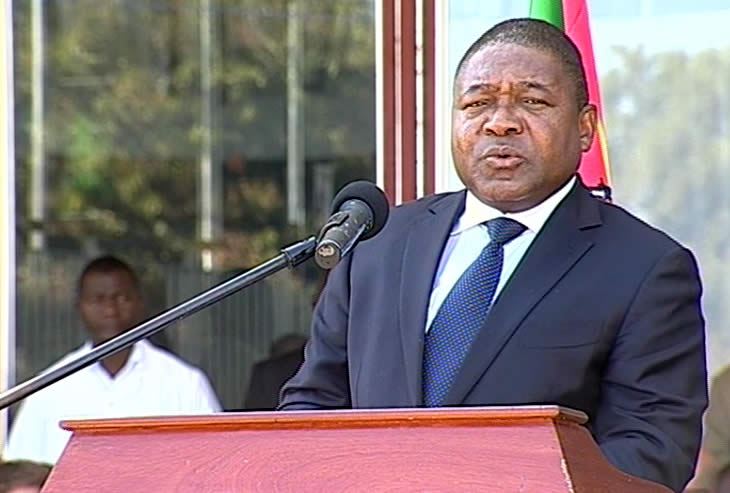
Photo: O País
Mozambican President Filipe Nyusi on Wednesday promised to work with the new leadership of the main opposition party, Renamo, in order to continue the dialogue for a definitive peace that he had begun with the party’s late leader, Afonso Dhlakama, who died of diabetes last Thursday.
Speaking at Dhlakama’s official funeral in the central city of Beira, Nyusi stressed that the Renamo leader’s untimely demise should not lead to any setbacks in the efforts to ensure lasting peace.
“We shall be honouring the memory of Dhlakama if we are able to conclude, in a responsible and speedy manner, the political dialogue, which is centred above all on decentralisation, and on the disarmament, demobilisation and reintegration of the Renamo forces”, he said.
A package of constitutional amendments on decentralisation, including proposals for the indirect election of provincial governors and district administrators, was negotiated between Nyusi and Dhlakama and is currently before the Mozambican parliament, the Assembly of the Republic.
In the weeks immediately prior to his death, Dhlakama had been in repeated telephone contact with Nyusi over how to dismantle and disarm the Renamo militia. Dhlakama’s key demand was that more Renamo officers should be placed in commanding positions in the armed forces (FADM) and the police.
The clearest result of the dialogue between the two men was the truce announced by Dhlakama in December 2016, which has held to the present, and which ended all Renamo armed activities.
“Let it be clear that I will continue the process of building peace, together with the new leadership of Renamo, always respecting the legal and institutional framework”, pledged Nyusi.
“The conclusion of this dossier will always be consider a collective work of Mozambicans, work to which Dhlakama contributed to the end of his days”, continued the President.
Nyusi said that, since he took office in early 2015, he had accepted the duty of creating “a culture of dialogue” that would sustain the building of a real peace. “This process has taken decisive steps forward”, he claimed, “and is creating a new culture whereby we accept our differences. We must not forget that, until a short time ago, violence and intimidation were undermining the bridges of our understanding”.
He added that Dhlakama had proved a partner in reconciliation, in order to “put a full stop to a past burdened with suspicion, hatred and death”.
“With Dhlakama, I maintained a close and intensive dialogue”, he said. “In this personal interaction we always sought to bring Mozambicans together in defence of the common interests that make us a nation”.
In that dialogue “there were moments of disagreement, of tension and a lot of pressure”, Nyusi continued. “There were also questions, doubts and a confrontation of ideas. It couldn’t be otherwise, because we knew that sensitive matters were at stake, on which depended the life of a State and its 28 million inhabitants”.
In their contacts, he said, the two leaders built mutual trust, learnt to respect each other, and to recognise each other “as brothers who share the same destination, which is called Mozambique”.
He assured the crowd of mourners that Dhlakama’s collaboration in the search for peace remains alive within him and he still recalls Dhlakama telling him, when they spoke by phone on 11 April, “Mr President, even if there are difficulties or obstacles, let us never cut the bonds of understanding. The peace process must not fail”.
Nyusi urged that, in difficult situations such as the present, “we should all have the strength and lucidity to overcome the emotions that run through us. Right now, all our differences become secondary and irrelevant”.
The government granted Dhlakama an official funeral, with state honours, under the law governing the status of the leader of the party with the second largest number of seats in parliament. Dhlakama was also a member of the Council of State, an advisory body to the President of the Republic, although he had not attended any of its meetings in the recent past.
Dhlakama’s coffin, draped in the national flag, was given a guard of honour and carried by members of the armed forces from the morgue in Beira Central Hospital to the large square in front of Beira rail station where the ceremony was held.
Dhlakama was a Roman Catholic, and the first part of the ceremony was a religious service, led by the Catholic Archbishop of Beira, Claudio Zuanna.
After the ceremony, Dhlakama’s coffin was taken by road to his birthplace, Mangunde, in the district of Chibabava, where he will be buried on Thursday.
It was initially said that the Mangunde funeral would be private, but a senior Renamo parliamentarian, Jose Manteigas, interviewed by the independent television station STV, insisted that anyone who wished to attend the funeral would be welcome.


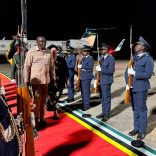
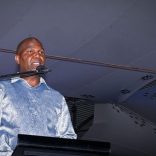
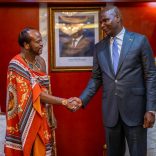
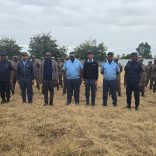
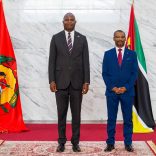
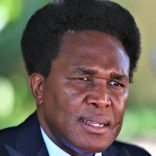




Leave a Reply
Be the First to Comment!
You must be logged in to post a comment.
You must be logged in to post a comment.